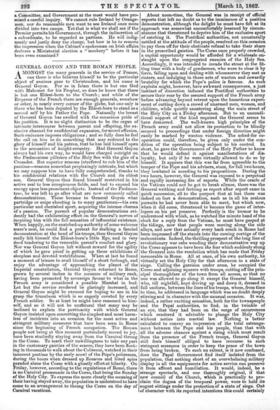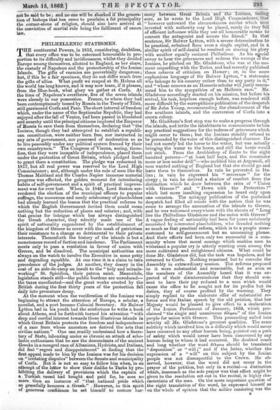GENERAL GOYON AND THE ROMAN PEOPLE.
13. one the many generals in the service of France, one there is who believes himself to be the particular object of anxious gaze to Christendom, and his name is General Goyon. For as in Islam there is but one God with Mahomet for his Prophet, so does he know that there is but one Eldest-born to the Church ; and while of the Emperor of the Prench there are enough generals, somehow or other, in nearly every corner of the globe, but one only is there who has been deputed by the Eldest-born to stand as a second self by his Father the Pope. Naturally the breast of General Goyon has swelled with the conscious pride of his position. It is no slight distinction to be the organ of intimate intercourse between parent and offspring, the ex- clusive channel for confidential expansion, for secret effusion. Such eminence imposes obligations ; and so fully does he feel the call on him to do something that may redound to the glory of himself and his patron, that be has laid himself open to the accusation of knight-errantry. Had General Goyon always had his own way, he would have charged outright on the Piedmontese pilferers of the Holy See with the glee of a Crusader. But superior reasons interfered to rob him of the pastime—reasons somewhat perplexingly intricate, but which we may suppose him to have fully comprehended, thanks to his confidential relations with the Church and its eldest son. General Goyon thus found himself restricted in his active zeal to less conspicuous fields, and had to expend his energy upon less prominent objects. Instead of the Piedmon- tese, he was left to go after what are now commonly called demonstrations. These became to General Goyon what partridge or snipe shooting is to many gentlemen—his own particular and cherished sport, acquiring the intense charms of a passion. The pursuit of popular demonstrations evi- dently had the exhilarating effect on the General's nerves of inspiring him with the full sensation of influential existence. When happily, on the snatched-up authority of some welcome mare's nest, he could find a pretext for stalking a fancied demonstration at the head of his troops, then General Goyon really felt himself the Eldest-born's little Ego, and in very deed tendering to the venerable parent's comfort and glory. Nor was General Goyon left without reward for the agility of which he gave proof in getting up these exhibitions of sleepless and devoted watchfulness. When at last he found a moment of leisure to avail himself of a short furlough, and enjoy the advantage of approaching the planet of the Imperial constellation, General Goyon returned to Rome, grown by several inches in the measure of military rank, having been promoted by sovereign favour to what in the French army is considered a possible Marshal in bud. Let but the service rendered be glaringly increased, and General Goyon might be excused for hoping to see in his grasp the truncheon which is so eagerly coveted by every French soldier. So at least he might have reasoned to him- self, and so it will not be umfatural that many may be inclined to explain the pertinacity with which General Goyon insisted upon converting the simplest and most harm- less of incidents into an occasion for the most active and stringent military measures that have been seen in Rome since the beginning of French occupation. The Roman people not being at this moment particularly moved to joy, have been studiedly staying away from the Carnival throng in the Corso. To mark their unwillingness to take any part in the customary gaieties of the season, they have been flock- ing in thousands to walk about the Coliseum, watched in their innocent pastime by the surly scowl of the Pope's policemen, during the hours when dressed up Zouaves and hired spies paraded alone the Corso with a ghastly effort at hilarity. On Friday, however, according to the regulations of Rome, there is no Carnival promenade in the Corso, that being the Sunday of the Holy City. To express the more clearly the meaning of their having stayed away, the population is understood to have come to an arrangement to throng the Corso on the day of Carnival vacations. About noon-time, the General was in receipt of official reports that left no doubt as to the imminence of a positive demonstration, although the delight he must have felt at its approach was somewhat uncomfortably lessened by circum- stances that threatened to deprive him of the exclusive sport of catching it. The Pontifical authorities, not unnaturally nettled at the attitude of the people, resolved on this occasion to pay them off for their obstinate refusal to take their share in the prescribed gaieties. The Corso once properly crowded, a capital opportunity would be afforded for a wholesale on- slaught upon the congregated enemies of the Holy See. Accordingly, it was intended to invade the street at the fit- ting time with a body of gendarmes, who were to clear it by force, falling upon and dealing with whomsoever they met as rioters, and indulging in those acts of wanton and cowardly brutality for which the Pope's police is famous. As such exploits might, however, have awkward consequences, a just instinct of discretion induced the Pontifical authorities to secure their rear by the assured support of the French army before advancing beyond retreat upon the hazardous experi- ment of cutting down a crowd of unarmed men, women, and children, while quietly sauntering along the main street of the Holy City on a Friday afternoon. But to an uncondi- tional support of the kind required the General seems to have demurred. The well-known high principles of the French army could not allow its protection to be blindly secured to proceedings that under foreign direction might easily be marked by wanton violence. The asked-for co- operation could, therefore, be given only under the con- dition of the operation being subject to his control. In short, he gave the Government of the Holy Father to know that he would defend it against manifestations of dis- loyalty, but only if he were virtually allowed to do so by himself. It appears that this was far from agreeable to the temper of the Pope and his advisers, since, for full two hours, they hesitated in acceding to his propositions. During the two hours, however, the General was exposed to a perpetual and rapidly increasing fire of reports. While the oracle of the Vatican could not be got to break silence, there was the General writhing and fretting as report after report came in quick succession, all to the purport that at last there was indeed on foot a demonstration, such as in all his zealous pursuits he had never been able to meet, but which now, when it did come, threatened to become the game of inter- lopers on his pet preserve. Perfectly is the tremor to be understood with which, as he watched the minute hand of the clock for a reply from the Vatican, he must have gasped at the tidings, now that people were moving along the side alleys, and now that actually every hack coach in Rome had been impressed off the stands into the coming cortege of the malcontents. Indeed, the thrilling prospect of the long line of revolutionary war cabs wending their demonstrative way up the Corso appears to have been the fear which suddenly stung the General into the resolution which has made that Friday memorable in Rome. All at once, of his own authority, he virtually set the Holy City for that afternoon in a state of siege. Calling the garrison under arms, he occupied the Corso and adjoining squares with troops, cutting off the prin- cipal thoroughfare of the town from all access, so that no one was allowed to go along it except the General himself, who, till nightfall, kept driving up and down it, dressed in full uniform, between the lines of his troops, whom, from time to time, he addressed in language which was no doubt deeply stirring and in character with the unusual occasion. It was, indeed, a rather exciting sensation, both for the townspeople and the Papal authorities, to find, in the twinkle of an eye, that they had been on the verge of occurrences which rendered it advisable to plunge the Holy City without notice into martial law. Nothing is better calculated to convey an impression of the total estrange- ment between the Pope and his people, than that with all the adverse chances against a rising which must result from the presence of the French troops, General Goyon still feels himself obliged to have recourse to such stringent measures in order to keep the peace of the town from being broken. To such an extent, is it now confessed, does the Papal Government find itself isolated from the population, that nothing short of an overwhelming military display in all the equipments for active service can preserve it from affront and humiliation. It would, indeed, be a strange spectacle, and one thoroughly original, if that new council of the Church, which is practically to pro- claim the dogma of the temporal power, were to hold its august sittings under the protection of a state of siege. Out of character with its reported intentions this could certainly not be said to be ; and no one will be shocked if the genera- tion of bishops that has come to proclaim a fat principality the corner-stone of religion, should also have arrived at the conviction of martial rule being the fulfilment of canon law.































 Previous page
Previous page